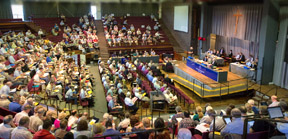
General Synod meets later this month, returning not only to women bishops but also intentional evangelism, Church Schools and how the Synod is elected and conducts its business. General Synod rep, Emma Ineson, previews the Synod's business.
From 18 to 20 November, General Synod will be meeting in London. Memories of last November, and the painful fall of the women bishops legislation at final consideration still loom large. It will come as no surprise that the main item under discussion this time is again the legislation for enabling women to be bishops.
Following last Novembers vote there has been much soul-searching about the issue, the process and the church in general. Since then, work has been underway to "start again with something better".
At last Julys session in York a substantial amount of time was given over to discussions in small groups, where Synod members could meet and talk face-to-face, rather than in the rather adversarial atmosphere of the debating chamber. That seemed to bear fruit and the debate produced some new and radical ways of working.
Following that, a fairly large steering group was established with the task of formulating the legislation, based on what has become known as "Option One" (the simplest form of legislation which was amended in July to specify the addition of a mandatory grievance procedure for parishes).
That group has now reported and at this group of sessions, Synod will be invited to welcome the proposals, along with the five guiding principles, already agreed by the House of Bishops, which underpin them. Again discussions will take place in small groups on the Tuesday, before the debate happens in the chamber on Wednesday.
Early indications are that what is on the table this time is likely to gain wider acceptance than the proposals that fell last November. If this latest set of proposals is approved, the process goes on to a revision stage, with possible final voting in November 2014. All of your seven Bristol General Synod Reps (one bishop, three clergy, and three laity) are looking forward to these debates and are keen to see the matter resolved as soon as possible.
Women bishops is not the only matter under discussion. There will be a debate on Intentional Evangelism, supporting the formation of an Archbishops Task Group on Evangelism. In Bristol, we are keen to hear what is said here, given our Dioceses emphasis on creating confidence in evangelism and heading toward the Archbishop of Canterburys visit to the Diocese next September 12-14, a key focus of which will be how we witness to the gospel in compelling and relevant ways.
Given that we have 68 Church schools in the Diocese serving over 15,000 children the Bristol Synod reps will be listening with interest to the debate on "The Church School of the future".
There will also be a discussion about how we elect General Synod representatives from the laity. Presently it is all Deanery Synod members that comprise the electorate, and this diocese is keen to ensure that the lay people who represent you at General Synod are drawn from a widely representative base. All of this highlights the importance of people in our churches engaging with the synodical processes and considering whether God might be calling them to serve on the Deanery, Diocesan and General Synods of the future.
The General Synod will also look at the way it is itself run, how often it meets and whether its ways of doing things are fit for purpose in the current context, responding to a motion put forward by the Diocese of London.
So you can see that there is much in this group of Sessions that will be of relevance to the Diocese of Bristol, its churches and their communities. Please do pray for us and watch this space for what emerges.
See the full agenda for the November General Synod
About the author
Revd Dr Emma Ineson is a General Synod rep, Associate Minister at St Matthew's Kingsdown and Bishop of Bristol's Chaplain